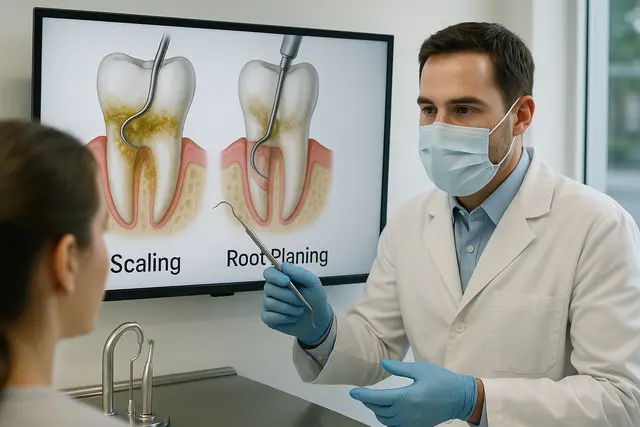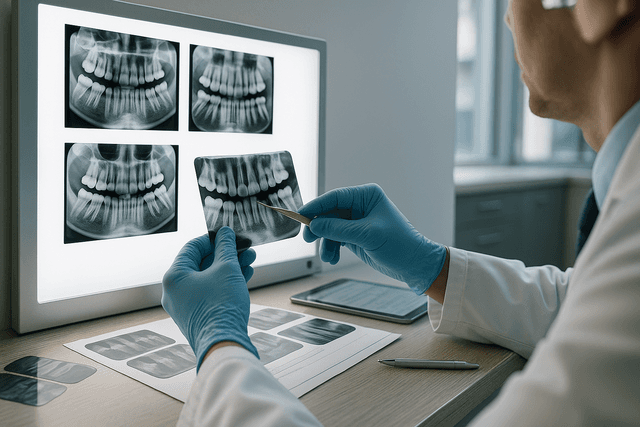General Dentistry
5 min read
Sep 15, 2025
Can a Sinus Infection Make Your Jaw Hurt? Understanding the Connection
Jaw pain can be unsettling, especially when it seems to appear out of nowhere alongside a stuffy nose or headache. Many people are surprised to learn that sinus infections can cause discomfort that feels like it’s coming from the jaw. Understanding the connection between your sinuses and jaw pain is key to getting the right treatment.

Let’s say you wake up with pressure behind your eyes, a throbbing headache, and to top it all off, pain in your jaw that makes chewing feel like a full-contact sport. You might wonder, is this just a bad day, or is your sinus infection trying to moonlight as a dental crisis?
Surprisingly, yes, a sinus infection can cause jaw pain. But it's not always that simple. Sinus issues, TMJ, dental problems, and even bruxism can all lead to similar symptoms. So how do you tell the difference?
Let’s break it down with less confusion and more clarity, minus the stiff medical jargon.
When a Sinus Infection Picks a Fight With Your Jaw
Sinuses are air-filled spaces in your skull, and you have a few pairs of them hanging out in different areas, including the maxillary sinuses, which sit right above your upper jaw. When these sinuses become inflamed during a sinus infection, things get uncomfortable fast. That pressure and inflammation can push down on surrounding nerves, muscles, and even your jawbone.
And here’s the kicker: the pain can sometimes radiate, making you feel like you've got a toothache or pain in your jaw on one side, even though your teeth are perfectly fine.
This is why sinus infections cause jaw pain, the swelling and buildup of mucus in the nose creates sinus pressure that leads to discomfort in areas like the upper jaw, jaw muscles, and even your ears.
What Is Sinusitis and Why Does It Hurt So Much?
Sinusitis is just the fancy name for a sinus infection. It can be triggered by a bacterial infection, viral bug, or even due to allergies. No matter the cause, it leads to inflammation in your sinus cavities. And when those tight little air pockets become inflamed and full of mucus, they put pressure on surrounding structures. Cue the jaw pain.
Sinusitis and TMJ can often cause overlapping symptoms like pain in your jaw, headaches, and facial pain. Sinus pain tends to get worse when you bend over or press on your cheeks. Sound familiar?
TMJ and Jaw Pain That Won’t Quit
Now, let’s talk about another common culprit: TMJ. That stands for temporomandibular joint, the little hinge that connects your jaw to your skull. If this joint goes rogue, you might experience pain when chewing, clicking sounds, or even your jaw locking up.
The condition is called TMJ disorder or temporomandibular joint disorder (TMD). TMJ can often show symptoms very similar to sinus-related jaw pain, which makes things tricky. You might feel pain on one side, deal with ear-related symptoms, or even think your jaw pain is dental-related when it’s not.
Adding more confusion to the mix? Sinus infection or TMJ problems often show up together, especially in people dealing with chronic sinusitis and TMJ issues. That’s why persistent jaw pain that doesn’t improve might need a closer look from your TMJ dentist.
When Dental Problems Masquerade as Sinus Trouble
Here’s where it gets even messier. Sometimes a dental problem, like a cavity or tooth infection, can mimic sinus symptoms. A bad tooth can lead to pain in your upper back teeth, and that pain may travel to your jaw, making you think it's all sinus-related.
Or flip that scenario: a sinus infection can cause pain that mimics a toothache or even a dental abscess. Confused yet? You’re not alone. Many symptoms overlap, which is why seeing your dentist can help rule out issues like untreated dental problems or a hidden tooth infection.
Common Symptoms That Share Many Faces
Let’s look at some of the most common symptoms of sinus, dental, and TMJ problems:
Pressure in your cheeks or forehead
Jaw pain on one side
Pain when chewing or yawning
Nasal congestion and mucus in the nose
Facial pain or sinus headache
Clicking in your jaw or limited jaw movement
Mouth pain or pain in your jaw that feels deep-rooted
Pain due to pressure around your sinuses
If you experience a combo of these, the source of your pain could be harder to pinpoint than finding a good parking spot at the dentist's office.
How to Tell the Difference and Get the Right Help
Trying to tell the difference between TMJ and a sinus infection? A few clues can help:
Sinus infection symptoms usually include nasal congestion, thick mucus, sinus pain, and pressure around the eyes and cheeks.
TMJ pain often flares with jaw movement, chewing, or stress (especially if you suffer from bruxism).
If your pain gets worse when you lie down or lean toward the sides of your face, think sinus. If it hurts when you chew or open your mouth wide, it might be TMJ. Still stumped? Your dentist or doctor can help you figure out what’s responsible for your symptoms.
When an Infection Can Cause Jaw Pain That Lingers
Sometimes, a bacterial infection can lead to complications that extend far beyond a stuffy nose. An untreated sinus infection can inflame the surrounding areas, affecting your lower jaw or even your neck. That kind of infection can cause pain in the jaw due to pressure on nerves and joints that normally don't get much attention.
And while we’re here, yes, a sinus infection can cause jaw discomfort that mimics TMJ disorder. That’s why it's so important not to self-diagnose or assume the pain would go away on its own.
What Can You Do About Sinus-Related Jaw Pain?
Whether you’re dealing with sinus pain, TMJ, or a dental issue, your first move should be to get a clear diagnosis. Your provider may recommend:
Nasal decongestants or saline rinses to reduce sinus pressure
Pain relievers for inflammation
Antibiotics if a bacterial infection is to blame
A referral to a TMJ dentist or specialist if jaw alignment or bruxism is suspected
Imaging like X-rays or CT scans to check for infection or joint issues
Don't ignore persistent jaw pain. It may seem small now, but left untreated, it can become chronic and interfere with daily life.
Can a Sinus Infection Really Cause Jaw Pain?
Yes, sinus infections, particularly those affecting the maxillary sinuses located above the upper jaw, can cause jaw pain. When these sinuses become inflamed or filled with mucus, they exert pressure on surrounding tissues, including nerves and muscles connected to the jaw. This can make the discomfort feel like a toothache or deep jaw pain, even when your teeth are perfectly healthy.
How Do I Know If My Jaw Pain Is From Sinus Infection or TMJ?
Distinguishing between sinus-related jaw pain and temporomandibular joint (TMJ) disorder can be tricky because both cause facial discomfort. Sinus pain is often paired with nasal congestion, thick mucus, and worsens when leaning forward or pressing on your cheeks. TMJ pain, on the other hand, is usually aggravated by jaw movement, chewing, or clenching and may include clicking or locking of the jaw. If your symptoms overlap, a dentist or physician can help with diagnosis.
Can Dental Problems Mimic Sinus-Related Jaw Pain?
Absolutely. A cavity, tooth infection, or abscess in the upper back teeth can radiate pain to the jaw and mimic sinus symptoms. Conversely, sinus infections can create pressure that feels like a dental issue. Because of this overlap, it’s common for patients to confuse the two. A professional exam, sometimes supported by imaging, is the only way to confirm whether the source of pain is dental, sinus, or both.
What Are the Best Ways to Treat Sinus-Related Jaw Pain?
Treatment depends on the root cause. For sinus infections, options include decongestants, saline rinses, or antibiotics if it’s bacterial. If TMJ disorder is contributing, a dentist may recommend a custom night guard, jaw exercises, or relaxation techniques. Dental infections, if identified, often require fillings, root canal therapy, or extractions. Persistent or severe jaw pain should not be ignored, as early intervention can prevent chronic issues and protect both oral and sinus health.
Read Next
Related Posts

General Dentistry
How to Stop Nerve Pain in Tooth: Fast Relief That Works
Tooth nerve pain can be one of the most intense and disruptive types of discomfort. It often strikes without warning and makes everyday activities like eating, drinking, or even talking feel unbearable. Understanding what causes this pain and how to manage it effectively is key to getting fast relief.
4 min read
Sep 15, 2025

General Dentistry
What Is SRP in Dentistry? A Complete Guide to Scaling and Root Planing
When it comes to dental health, most people think regular cleanings are enough to keep their smile safe. But sometimes, what’s happening below the gumline needs more attention. Scaling and root planing (SRP) is a treatment designed to address gum disease at its source, protecting both your gums and teeth from long-term damage.
5 min read
Sep 10, 2025

General Dentistry
How to Read Dental X-Rays: A Visual Guide to Oral Health Clues
Dental x-rays may look like abstract black-and-white images, but they play a powerful role in uncovering what's really going on beneath the surface of your smile. From detecting hidden cavities to revealing signs of gum disease, these diagnostic tools are essential for maintaining oral health and catching problems early.
6 min read
Sep 10, 2025
Don’t have time to research every dentist around you?
See why 30k+ patients trusted us